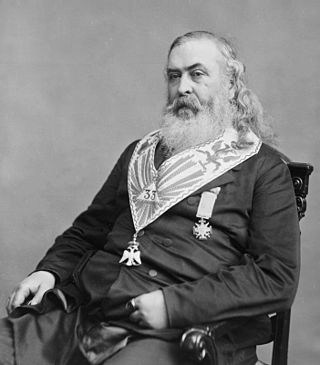
Albert Pike was an American author, poet, orator, editor, lawyer, jurist and Confederate States Army general who served as an associate justice of the Arkansas Supreme Court in exile from 1864 to 1865. He had previously served as a senior officer of the Confederate States Army, commanding the District of Indian Territory in the Trans-Mississippi Theater. A prominent member of the Freemasons and a staunch opponent of racial equality, Pike served as the Sovereign Grand Commander of the Supreme Council, Scottish Rite, Southern Jurisdiction from 1859 to 1891.

Major-General Patrick Ronayne Cleburne was a senior officer in the Confederate States Army who commanded infantry in the Western Theater of the American Civil War.

Thomas Carmichael Hindman Jr. was an American lawyer, politician, and a senior officer of the Confederate States Army during the American Civil War. Born in Knoxville, Tennessee, he later moved to Mississippi and became involved in politics. He served in the Mexican–American War from 1846 to 1848. Hindman practiced law and in 1853 was elected to the Mississippi House of Representatives. After his term expired in 1854, he moved to Helena, Arkansas where there were more opportunities for his political ambitions. Hindman opposed the Know-Nothing party and the ruling Conway-Johnson dynasty. Elected to the United States House of Representatives in 1858, he supported slavery and secession. During Reconstruction he was assassinated.
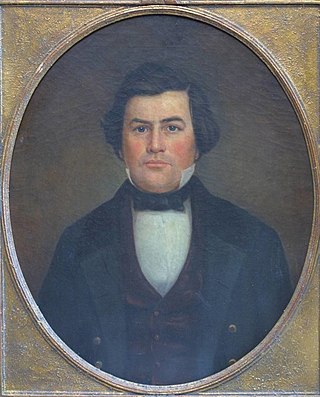
John Selden Roane was an American politician and lawyer who served as the fourth Governor of Arkansas from 1849 to 1852. Prior to this he commanded the Arkansas Mounted Infantry Regiment following the death of Colonel Archibald Yell at the Battle of Buena Vista. Roane also served as a senior officer of the Confederate States Army who commanded infantry in the Trans-Mississippi Theater of the American Civil War.

Augustus Hill Garland was an American lawyer and Democratic politician from Arkansas, who initially opposed Arkansas' secession from the United States, but later served in both houses of the Congress of the Confederate States and the United States Senate, as well as becoming the 11th governor of Arkansas (1874–1877) and the 38th attorney general of the United States (1885–1889). He wrote several books.
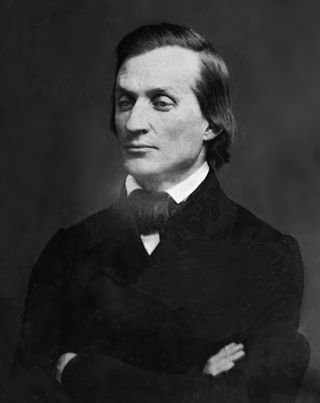
Solon Borland was an American politician, journalist, physician and military officer. He served as a United States Senator from Arkansas from 1848 to 1853. Later in life, he served as an officer of the Confederate States Army including commanded of a cavalry regiment in the Trans-Mississippi Theater of the American Civil War.

The Trans-Mississippi Department was a geographical subdivision of the Confederate States Army comprising Arkansas, Missouri, Texas, western Louisiana, Arizona Territory and the Indian Territory; i.e. all of the Confederacy west of the Mississippi River. It was the last military department to surrender to United States forces in 1865.

The Arkansas Democrat-Gazette is the newspaper of record in the U.S. state of Arkansas, printed in Little Rock with a northwest edition published in Lowell. It is distributed for sale in all 75 of Arkansas' counties.
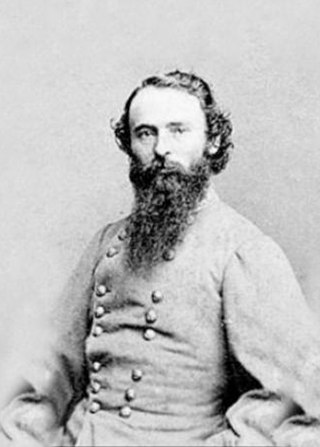
James Fleming Fagan was an American farmer, politician, and senior officer of the Confederate States Army during the American Civil War. His brigade distinguished itself in the Camden Expedition of 1864, helping to drive the U.S. Army's Seventh Corps from southwest Arkansas.
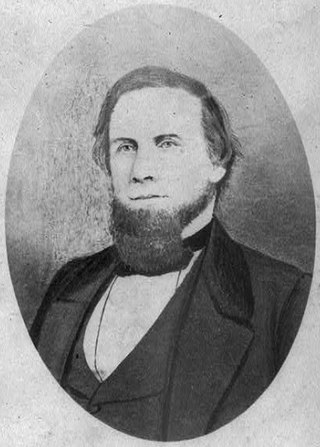
Albert Rust was an American politician and slaveholder, who served as a delegate from Arkansas to the Provisional Congress of the Confederate States from 1861 to 1862. A member of the Democratic Party, he was the U.S. representative from Arkansas's 2nd congressional district (1859–1861). He also served as a senior officer of the Confederate States Army who commanded infantry in the Eastern, Western, and Trans-Mississippi theaters of the American Civil War.
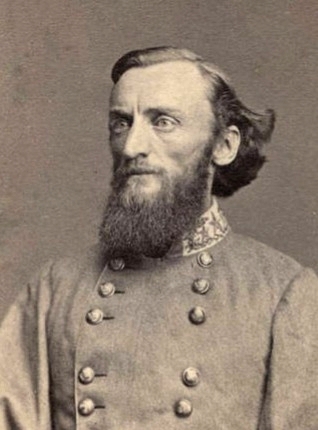
John Sappington Marmaduke was an American politician and soldier. He was the 25th governor of Missouri from 1885 until his death in 1887. During the American Civil War, he was a senior officer of the Confederate States Army who commanded cavalry in the Trans-Mississippi Theater.

During the American Civil War, Arkansas was a Confederate state, though it had initially voted to remain in the Union. Following the capture of Fort Sumter in April 1861, Abraham Lincoln called for troops from every Union state to put down the rebellion, and Arkansas along several other southern states seceded. For the rest of the civil war, Arkansas played a major role in controlling the Mississippi River, a major waterway.

The history of Arkansas began millennia ago when humans first crossed into North America. Many tribes used Arkansas as their hunting lands but the main tribe was the Quapaw, who settled in the Arkansas River delta upon moving south from Illinois. Early French explorers gave the territory its name, a corruption of Akansea, which is a phonetic spelling from the Illinois language word for the Quapaw. This phonetic heritage explains why "Arkansas" is pronounced so differently than the U.S. state of "Kansas" even though they share the same spelling.
Fort McCulloch was a Confederate military fort built by CSA Brigadier General Albert Pike in the Indian Territory during the American Civil War after the Battle of Pea Ridge.
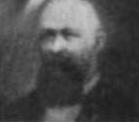
John McClure, nicknamed Poker Jack, was a politician and judge in Arkansas during Reconstruction. He was originally a lawyer from Ohio.
The 3d Arkansas Cavalry Regiment (1861–1865) was a Confederate Army Cavalry regiment during the American Civil War.
The following is a timeline of the history of the city of Little Rock, Arkansas, US.

The 1890 Arkansas gubernatorial election was held on September 1, 1890. Incumbent Democratic Governor James Philip Eagle defeated Union Labor and Republican fusion nominee Napoleon B. Fizer with 55.51% of the vote.
The Little Rock Campaign, officially known as Advance of the Union forces upon Little Rock, Arkansas, was a campaign conducted by the Union Army in Arkansas during the American Civil War. The offensive was designed to capture Little Rock.

Edward W. Gantt was an American politician and Confederate soldier who defected to the Union during the American Civil War and was a Freedmen's Bureau agent during Reconstruction. Born in Maury County, Tennessee, in 1829, Gantt was a delegate to the 1850 Nashville Convention, which considered secession. Later in the decade, he moved to Arkansas, which he felt allowed him more opportunities to gain prominence. He spread secessionist rhetoric after the 1860 United States presidential election. He was elected to the United States House of Representatives but did not take his seat. After the outbreak of the American Civil War in 1861, Gantt became the colonel of the 12th Arkansas Infantry Regiment. He was wounded in an artillery duel while his regiment was in reserve at the Battle of Belmont, and in April 1862 was captured when the Confederate defenses of Island Number Ten fell.















